Related Research Articles
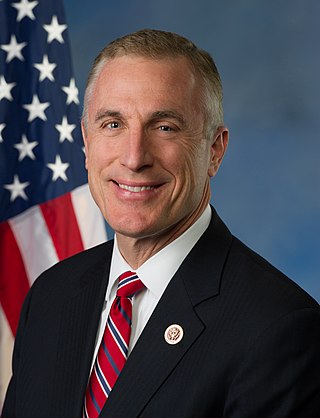
Timothy Francis Murphy is an American former politician and psychologist who served as the U.S. representative for Pennsylvania's 18th congressional district from 2003 until his resignation in 2017. The district included several suburbs south of Pittsburgh. A member of the Republican Party, he also represented the 37th Senate district in the Pennsylvania State Senate from 1996 to 2003. Murphy consistently carried the 18th district with at least 58% of the vote, including unopposed re-election bids in 2014 and 2016.
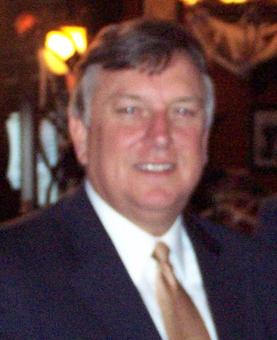
Mark Stephen Singel is an American politician who served as the 27th lieutenant governor of Pennsylvania from 1987 to 1995, alongside Governor Bob Casey. Singel served as the state's acting governor from June 14, 1993 to December 13, 1993, during Casey's lengthy battle with amyloidosis and subsequent multiple organ transplant.
Barbara Hafer is an American politician and convicted felon from the Commonwealth of Pennsylvania. She served as a member of the Allegheny County Board of Commissioners from 1984 to 1989, as the Auditor General of Pennsylvania from 1989 to 1997 and as the Treasurer of Pennsylvania from 1997 to 2005.

Donald Allen Bailey was an American lawyer and politician from Pennsylvania. He was a Democratic member of the United States House of Representatives from 1979 to 1983, Auditor General of Pennsylvania from 1985 to 1989, and a candidate for the Democratic nomination for United States Senate and Governor of Pennsylvania. His Congressional District (PA-21) included all of Westmoreland County, Pennsylvania with a sliver of Allegheny County, Pennsylvania, prior to the 1981 redistricting.

Pennsylvania's 12th congressional district is located in southwestern Pennsylvania, including Pittsburgh and much of Allegheny County, as well as some of Westmoreland County. Since January 3, 2023, it has been represented by Summer Lee.

The 2008 congressional elections in Pennsylvania was held on November 4, 2008, to determine who will represent the state of Pennsylvania in the United States House of Representatives. Pennsylvania has 19 seats in the House, apportioned according to the 2000 United States census. Representatives are elected for two-year terms; those elected will serve in the 111th Congress from January 4, 2009, until January 3, 2011. The election coincides with the 2008 U.S. presidential election.

David G. Argall is an American politician who is a member of the Pennsylvania State Senate, elected in a special election on March 3, 2009 following the death of fellow Republican James J. Rhoades. He was elected a member of the Pennsylvania House of Representatives in 1984 and served as Republican Whip from 2004 to 2008. Argall lost the 17th Congressional District election in 2010 after challenging incumbent Congressman Tim Holden.

Samuel E. Rohrer is an American businessman and politician. A member of the Republican Party, he served as a member of the Pennsylvania House of Representatives from the 128th District.

Pennsylvania held various elections on November 2, 2010. These include elections for a Senate seat, a gubernatorial race, and many state legislature races.

The 2010 special election for the 12th congressional district of Pennsylvania was held on May 18, 2010, to fill the seat left vacant by the death of Democratic U.S. Representative John Murtha. Democratic nominee Mark Critz, Murtha's former district director, defeated Republican nominee Tim Burns. Both candidates were nominated at their respective primary election concurrent with the special election and faced off in the general election November 2010, with Critz again defeating Burns.

Redistricting in Pennsylvania refers to the decennial process of redrawing state legislative and federal congressional districts in Pennsylvania.

Mark Stephen Critz is an American politician and former U.S. Representative for Pennsylvania's 12th congressional district, having served from a special election in May 2010 until January 2013. He is a member of the Democratic Party. The district during his tenure, which was located in the southwestern portion of the state, stretched from Johnstown to the southern suburbs of Pittsburgh.

The 2010 congressional elections in Pennsylvania were held on November 2, 2010. Pennsylvania had nineteen seats in the United States House of Representatives. The election was held on the same day as many other PA elections, and the same day as House of Representatives elections in other states. Party primary elections were held May 18, 2010.

The 2012 United States Senate election in Pennsylvania was held on November 6, 2012, alongside a presidential election, other elections to the United States Senate in other states, as well as elections to the United States House of Representatives and various state and local elections. Incumbent Democratic U.S. Senator Bob Casey, Jr. ran for and won re-election to a second term, defeating Republican nominee Tom Smith, and Libertarian nominee Rayburn Smith.

The 2012 United States House of Representatives elections in Pennsylvania were held on Tuesday, November 6, 2012, to elect the 18 U.S. representatives from the state of Pennsylvania, a loss of one seat following the 2010 United States census. The elections coincided with the elections of other federal and state offices, including a quadrennial presidential election and an election to the U.S. Senate. Primary elections were held Tuesday, April 24.

Keith James Rothfus is an American lawyer and politician who served as the U.S. representative for Pennsylvania's 12th congressional district from 2013 to 2019. He succeeded Democratic Representative Mark Critz, whom he defeated in the 2012 election. Prior to serving in Congress, he worked as an attorney. After new congressional district maps were released by the Pennsylvania Supreme Court in February 2018, Rothfus became a candidate in Pennsylvania's 17th congressional district, where he was defeated for re-election by the incumbent from the 18th district, Democrat Conor Lamb.
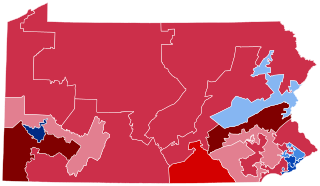
The 2014 United States House of Representatives elections in Pennsylvania were held on Tuesday, November 4, 2014, to elect the 18 U.S. representatives from the Commonwealth of Pennsylvania, one from each of the state's 18 congressional districts. The elections coincided with other elections to the United States Senate and House of Representatives and various state and local elections, including the Governor of Pennsylvania and Lieutenant Governor of Pennsylvania.
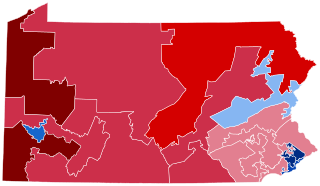
The 2016 United States House of Representatives elections in Pennsylvania were held on November 8, 2016, to elect the 18 U.S. representatives from the Commonwealth of Pennsylvania, one from each of the state's 18 congressional districts. The elections coincided with the 2016 U.S. presidential election, as well as other elections to the House of Representatives, elections to the United States Senate, and various state and local elections. The primaries were held on April 26.
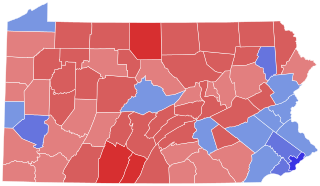
The 2018 United States Senate election in Pennsylvania took place on November 6, 2018, to elect a member of the United States Senate to represent the State of Pennsylvania, concurrently with other elections to the United States Senate, elections to the United States House of Representatives, and various state and local elections. This was one of ten Democratic-held Senate seats up for election in a state that Donald Trump won in the 2016 presidential election. The primary elections were held on May 15. Incumbent Democratic Senator Bob Casey Jr. ran for re-election to a third term. Casey, who faced no primary opposition, defeated the Republican nominee, Lou Barletta, Green Party nominee Neal Gale, and Libertarian Party nominee Dale Kerns. Casey was the first senator to be elected to a third term from Pennsylvania since Arlen Specter in 1992, and the first Pennsylvania Democrat to be popularly elected to three terms in the Senate.

The 2018 Pennsylvania state elections took place on November 6, 2018. On that date, the Commonwealth of Pennsylvania held elections for the following offices: Governor and Lieutenant Governor, U.S. Senate, U.S. House of Representatives, Pennsylvania State Senate, Pennsylvania House of Representatives, and various others. Primary elections took place on May 15, 2018.
References
- ↑ "Election 2010 – Pennsylvania 12th District Special Election – Burns vs. Critz". RealClearPolitics. April 28, 2010. Retrieved August 23, 2010.
- ↑ [ dead link ]
- 1 2 Roarty, Alex (October 12, 2011). "Another Republican Jumps in Against Bob Casey". NationalJournal. Archived from the original on October 13, 2011. Retrieved October 12, 2011.
- 1 2 Gibson, Keegan. "Tim Burns Announces for Senate". PoliticsPA. Retrieved October 12, 2011.
- 1 2 Gibson, Keegan (February 2, 2012). "Burns Exits Senate Race". PoliticsPA. Retrieved February 23, 2012.
- ↑ Murtha's open Pa. seat gives GOP hope Kathy Kiely, USA Today . Retrieved April 27, 2010.
- 1 2 3 Tim Burns profile Archived April 12, 2010, at the Wayback Machine Tim Burns Campaign site. Retrieved April 26, 2010.
- ↑ Pittsburgh Business Times 05/31/2002 Atlanta company is buying TechRx
- ↑ Pittsburgh Tribune-Review 3/12/2010 GOP picks nominee for Murtha's seat
- ↑ Blake, Aaron (February 17, 2010). "Murtha special election added to May 18th primary schedule". The Hill. Retrieved March 8, 2010.
- 1 2 Reabuck, Sandra K. (March 1, 2010). "Parties set to make House picks". The Tribune-Democrat . Archived from the original on February 4, 2013. Retrieved March 6, 2010.
- ↑ "PA-12 Special Election Is Set", RealClearPolitics.com, March 12, 2010,
- ↑ FreedomWorks will endorse Tim Burns in Pennsylvania David Weigel, The Washington Post , April 21, 2010. Retrieved April 26, 2010.
- ↑ "Inside the Race for Murtha's Seat", Hannity, April 26, 2010, Fox News, As Retrieved 27 April 2010
- ↑ "2010 Special Election for the 12th Congressional District". Pennsylvania Department of State. Archived from the original on May 22, 2010. Retrieved May 19, 2010.
- ↑ Gibson, Keegan (January 26, 2012). "Burns for Congress Instead of Senate?". PoliticsPA. Retrieved February 23, 2012.
- ↑ "Critz beats Altmire in 12th Congressional District". Ellwood City Ledger. April 25, 2012. Retrieved August 21, 2012.